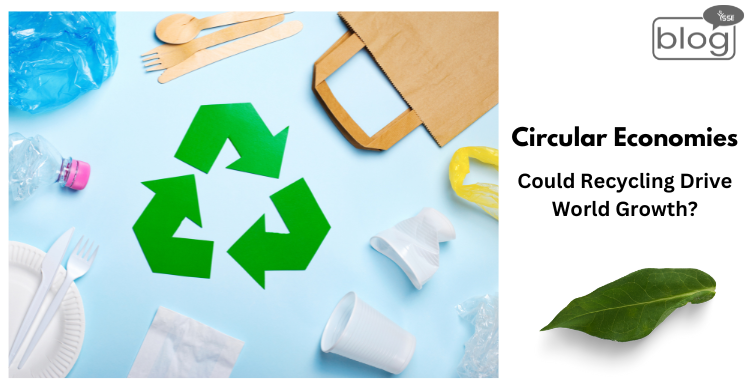While the whole world is striving to become sustainable, the concept of a circular economy has appeared to be one of the cornerstones of this movement. Contrary to a linear model where everything moved according to the “take-make-dispose” pattern, the circular economy puts stress on waste reduction, prolonging the life cycles beyond the normal period, and natural system regeneration. It’s all about recycling, which would help resolve a host of environmental problems and give an earnest boost to international economic growth.
The operation includes principles of designing out waste and pollution, keeping products and materials in use, and regenerating natural systems. Such is the case when this is where recycling fits. Recycling in this case decreases demand for raw material extraction, energy conservation, and minimization of environmental pollution by reprocessing the waste materials into reusable resources. For example, it has been noticed that recycling aluminum saves up to 95% of the energy required for its production from raw materials; hence, this evidence economic and ecological benefits coming from circularity.
Besides, recycling has great effects on economic development since it opens up employment opportunities and drives innovation. Collection, sorting, and reprocessing industries not only introduce labor into the job markets but also allow other businesses and industries to save through lowered input costs of recyclables as feedstock in businesses in the construction, manufacturing, and packaging industries. In addition, resource security is ensured—what many countries experience presently when raw materials are obtained mainly by importation. Closing material loops helps economies reduce dependence on turbulent markets and guarantee stable supplies of resources.
Environmental benefits are closely related to the notion of global sustainability by promoting recycling. It reduces greenhouse gas emissions, saves water and energy, and reduces pressure on natural resources. The introduction of circular economy strategies related to recycling in the main sectors of cement, aluminum, and plastics could reduce up to 39% of global CO2 emissions, that is, all the emissions produced by transport worldwide. This underlines how much recycling is important in fighting climate change and a sustainable future.
Large-scale recycling faces severe barriers, including a lack of proper infrastructure, especially in developing countries, to effectively collect waste and take it further for recycling; poor segregation results in the contamination of materials to be recycled, further diminishing their quality and market value. Public awareness and participation are also very important. Without proper understanding and commitment, not even the best recycling programs can work at full capacity. These gaps can only be filled in through the concerted effort of governments, businesses, and communities.
EPR policy can be a tool for governments to ensure that recycling is promoted by placing responsibility on the producer to take care of product wastes, manage them for recycling, and undertake final disposals. Businesses can take on circular business models where an important focus would be given to product design for recyclability and investing in new technologies. Technology, for instance, has leaped to the forefront in chemical recycling, where what was once considered non-recyclable can now be recycled. Public engagement is equally important; education brings about a culture of recycling and responsible consumption.
Nevertheless, recycling could still be a robust driver of growth and sustainability for countries across the world: it adds value by way of waste-to-resource conversion, builds economic resilience, and contributes to reducing environmental degradation. In such a context, embedding recycling in general strategies for the circular economy enables countries to build a future in which economic prosperity will be possible with environmental protection.
Success will be long-term, involving commitment on a mass scale to taking the road of recycling and circular economies, every step inducting new industries to emerge and communities into practice. And the dream actually begins to be very real: one in which economic development does not necessarily need to be at the expense of the planet. Recycling is much more than an alternative to waste management; it is a key issue of sustainable development and, by all means, the driver of global growth in the 21st century.
To read more blogs like this click here
Writer
Fazlul Karim
Intern, Content Writing Department
YSSE

